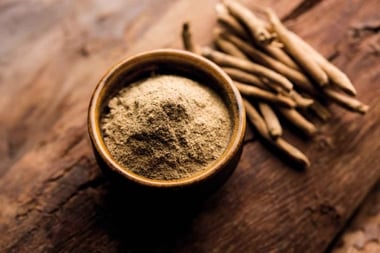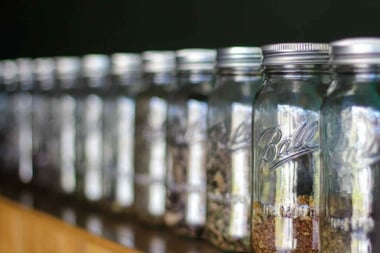
From puffy airplane ankles to pre-menstrual bloating, water retention can be uncomfortable. Most of the time, this irritating issue can easily be resolved through natural methods. Try these naturalremedies to beat the bloat—and learn how to identify when swelling may indicate a more serious condition, requiring the help of a healthcare practitioner.
Puffy face? Rings or shoes suddenly too tight? You may not have gained weight—the culprit may be water retention or edema. What causes it, and what can you do about it?
Water regulation
For your body to work properly, it must contain just the right amount of water. The important job of maintaining water balance falls on the kidneys. One of the mechanisms that aids the kidneys, antidiuretic hormone (ADH), also called vasopressin, which is secreted by the pituitary gland, acts as the floodgate keeper.
Vasopressin is released into the bloodstream to prevent excessive loss of water from the kidneys. It also tells the kidneys when to hold onto water, such as when the body is dehydrated and needs more water to function and survive.
For reasons not yet known, sometimes the regulatory actions that control vasopressin production, and thus the kidneys, don’t turn off even when the body already has enough water.
Getting to the bottom of the swell
Our bodies are up to 70 percent water, but for many, women in particular, it can feel like much more because of premenstrual tension, pregnancy, medications such as the birth control pill, or stints of physical inactivity and poor diet.
These are the transient, easily remedied causes of water retention. But there are many more serious causes of edema (the medical term for water retention) that make that swollen, bloated feeling cause for concern.
First, let’s distinguish between bloating and true edema. According to Aminu Bello, MD, PhD, bloating is the feeling one gets from buildup of gas or fluid. If it is gas, says Bello, the underlying cause is often food related. If the bloating is due to water retention in the tummy area it’s called ascites.
As a nephrologist at the University of Alberta, Bello sees many people with fluid retention and categorizes the causes as either activity- or condition-related. The most common causal activities include sitting or standing for too long, flights lasting more than seven hours, or long-distance driving. A diet that’s very high in salt can also cause a bloated feeling.
However, not everyone develops swollen limbs from these behaviours. Bello explains that edema is not a disease in itself but a symptom of underlying conditions. Certain conditions can predispose a person to water retention.
For instance, people with heart, kidney, or liver conditions are most at risk for accumulating fluid and should consult their health care practitioner to minimize the congestive effects of edema. Certain drugs including steroids, contraceptives, high blood pressure pills, and diabetes medication can also cause edema.
Women who are otherwise healthy are more prone than men to bloating and water retention. Studies show that premenstrual fluid retention is not a myth; maximal fluid retention throughout the body actually occurs on the first day of menstruation and declines thereafter.
Pregnancy is another common, healthy situation in which women experience swelling, particularly in their hands and feet.
Treating the imbalance
Dawn Aarons, a doctor of acupuncture, specializes in treating pregnant women in the Toronto area. She agrees with Bello’s explanation of edema as the body’s way of telling us there is an underlying imbalance in one—or a few—of its key systems.
Aarons focuses on pinpointing the source of the imbalance. As a practitioner of traditional Chinese medicine, she believes that while the liver is the main organ responsible for the free flow of fluid and blood, all the yin organs, namely the spleen, heart, and kidneys, as well as the liver, can be involved in edema.
Water retention can occur in any and all parts of the body; however, certain localized swelling points back to an imbalance in a specific organ. Where the water retention occurs is Aarons’ key clue, telling her which organ to focus on. For instance, swelling in the feet and ankles often points to a kidney yang deficiency.
Encouraging free flow of fluids
If swollen extremities are making you feel larger than life, Aarons recommends the following self-care behaviours.
- Avoid sitting for a long time and avoid crossing your legs, which can constrict the flow of bodily fluids, including water.
- Wear flat shoes and consider wearing compression stockings, which will help improve circulation.
- Elevate your feet for at least 20 minutes three to four times per day; this helps bodily fluids circulate.
- If you are pregnant, sleep on your left side; this helps kidneys eliminate waste products and fluids, which in turn reduces swelling in ankles, feet, and hands.
When to see a health care practitioner— serious causes of edema
Dr. Aminu Bello, a clinical nephrologist, recommends seeking help from a health professional as soon as you have any signs of water retention, including swollen ankles, feet, or legs or puffiness around the eyes. This swelling may seem trivial, but it can be a sign of serious health issues such as:
- varicose veins or deep vein thrombosis (DVT) in a person with chronic insufficient venous return
- increased blood pressure and risk of stroke in a person with atherosclerosis
- diminished cardiac output in a person with congestive heart disease
- heavy loss of protein in the urine or impaired kidney function in someone with kidney disease
- low levels of blood albumin in a person with liver or kidney disease
If edema goes unchecked, excess fluid in the body can cause blood circulation to decrease as blood vessels gradually lose their elasticity. Reduced circulation around muscles and joints can lead to poor mobility, joint stiffness, and pain.
As many pregnant women can attest, swelling can cause stretch marks. In severe cases of edema, pregnancy or non-pregnancy related, stretched skin can become so irritated that an infection ensues.
Lifestyle tips to avoid edema
If you’re an otherwise healthy person who experiences fluid retention from time to time, consider the following diet and exercise tips to get rid of that bloated feeling.
Limit sodium intake Water follows salt, so avoid fast food or processed food and read nutrition labels so you can choose the food products that are lowest in sodium. Canned soups, frozen dinners, and condiments are notorious, but watch out for cereals, breads, and baked goods that can also have a significant amount of hidden sodium.
Drink black teaStudies show that plain old orange pekoe tea increases urine output. It also has antioxidants that reduce inflammation.
Avoid foods that may promote swellingSome foods can cause the body to retain water, leading to swelling. As well as salt-containing foods, avoid refined foods such as white breads, pastas, and sugar as well as baked goods such as cookies, crackers, cakes, and doughnuts. Limit alcohol and tobacco consumption; these too can lead to swelling and water retention.
Keep movingExercise encourages fluid to be pumped back to the heart away from outer extremities. If stuck sitting or standing for a long time, wiggle your toes, flex your feet, or shift your weight back and forth to activate your lymphatic pump and promote venous return.
Eat your waterIncrease your intake of high-water content foods such as celery, melons, leafy green vegetables (especially dandelion greens, watercress, and spinach), grapes, peas, and carrots. These foods are thought to encourage diuresis—and they also help you avoid processed, high-sodium foods.




